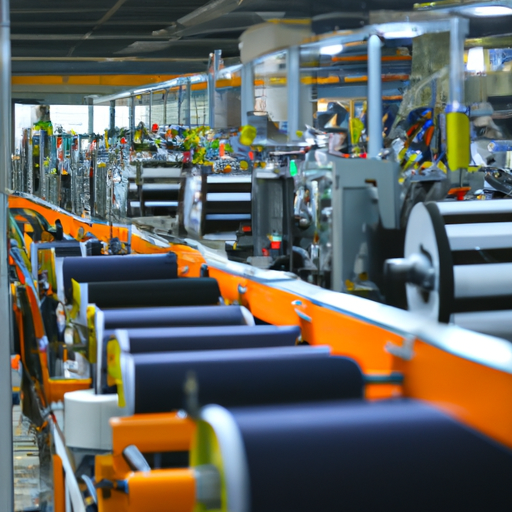

Coils are an essential component in many industries, including HVAC, automotive, and electronics. They are used for a variety of purposes, such as heating, cooling, and transmitting electrical signals. Mainstream coil manufacturers offer a wide range of products to meet the diverse needs of their customers. In this article, we will discuss the parameters that define the mainstream coil product line.

2. Material: Another important parameter to consider is the material used to make the coil. Mainstream coil manufacturers offer coils made from a variety of materials, including copper, aluminum, and stainless steel. The choice of material will depend on factors such as the operating temperature, corrosion resistance, and cost. Copper coils are commonly used in HVAC systems due to their excellent heat transfer properties, while stainless steel coils are preferred in corrosive environments.
3. Size: The size of the coil is another important parameter to consider. Mainstream coil manufacturers offer coils in a wide range of sizes to accommodate different applications. The size of the coil will depend on factors such as the heat load, airflow rate, and space constraints. Larger coils are typically used in industrial applications where high heat transfer rates are required, while smaller coils are used in residential HVAC systems.
4. Fin Type: The fin type is another parameter to consider when selecting a mainstream coil product. Fins are used to increase the surface area of the coil, which improves heat transfer efficiency. Mainstream coil manufacturers offer coils with different fin types, such as flat fins, wavy fins, and lanced fins. The choice of fin type will depend on factors such as the heat transfer requirements and airflow rate.
5. Circuiting: The circuiting of the coil is another important parameter to consider. Mainstream coil manufacturers offer coils with different circuiting configurations, such as single circuit, dual circuit, and multiple circuit. The circuiting of the coil will affect the heat transfer efficiency and pressure drop. Single circuit coils are commonly used in residential HVAC systems, while multiple circuit coils are used in industrial applications where precise temperature control is required.
6. Coating: The coating of the coil is another parameter to consider when selecting a mainstream coil product. Coatings are used to protect the coil from corrosion and improve heat transfer efficiency. Mainstream coil manufacturers offer coils with different coating options, such as epoxy coating, phenolic coating, and Teflon coating. The choice of coating will depend on factors such as the operating environment and maintenance requirements.
In conclusion, mainstream coil manufacturers offer a wide range of products to meet the diverse needs of their customers. When selecting a coil product, it is important to consider parameters such as coil type, material, size, fin type, circuiting, and coating. By understanding these parameters, customers can choose the right coil product for their specific application.
Coils are an essential component in many industries, including HVAC, automotive, and electronics. They are used for a variety of purposes, such as heating, cooling, and transmitting electrical signals. Mainstream coil manufacturers offer a wide range of products to meet the diverse needs of their customers. In this article, we will discuss the parameters that define the mainstream coil product line.

2. Material: Another important parameter to consider is the material used to make the coil. Mainstream coil manufacturers offer coils made from a variety of materials, including copper, aluminum, and stainless steel. The choice of material will depend on factors such as the operating temperature, corrosion resistance, and cost. Copper coils are commonly used in HVAC systems due to their excellent heat transfer properties, while stainless steel coils are preferred in corrosive environments.
3. Size: The size of the coil is another important parameter to consider. Mainstream coil manufacturers offer coils in a wide range of sizes to accommodate different applications. The size of the coil will depend on factors such as the heat load, airflow rate, and space constraints. Larger coils are typically used in industrial applications where high heat transfer rates are required, while smaller coils are used in residential HVAC systems.
4. Fin Type: The fin type is another parameter to consider when selecting a mainstream coil product. Fins are used to increase the surface area of the coil, which improves heat transfer efficiency. Mainstream coil manufacturers offer coils with different fin types, such as flat fins, wavy fins, and lanced fins. The choice of fin type will depend on factors such as the heat transfer requirements and airflow rate.
5. Circuiting: The circuiting of the coil is another important parameter to consider. Mainstream coil manufacturers offer coils with different circuiting configurations, such as single circuit, dual circuit, and multiple circuit. The circuiting of the coil will affect the heat transfer efficiency and pressure drop. Single circuit coils are commonly used in residential HVAC systems, while multiple circuit coils are used in industrial applications where precise temperature control is required.
6. Coating: The coating of the coil is another parameter to consider when selecting a mainstream coil product. Coatings are used to protect the coil from corrosion and improve heat transfer efficiency. Mainstream coil manufacturers offer coils with different coating options, such as epoxy coating, phenolic coating, and Teflon coating. The choice of coating will depend on factors such as the operating environment and maintenance requirements.
In conclusion, mainstream coil manufacturers offer a wide range of products to meet the diverse needs of their customers. When selecting a coil product, it is important to consider parameters such as coil type, material, size, fin type, circuiting, and coating. By understanding these parameters, customers can choose the right coil product for their specific application.